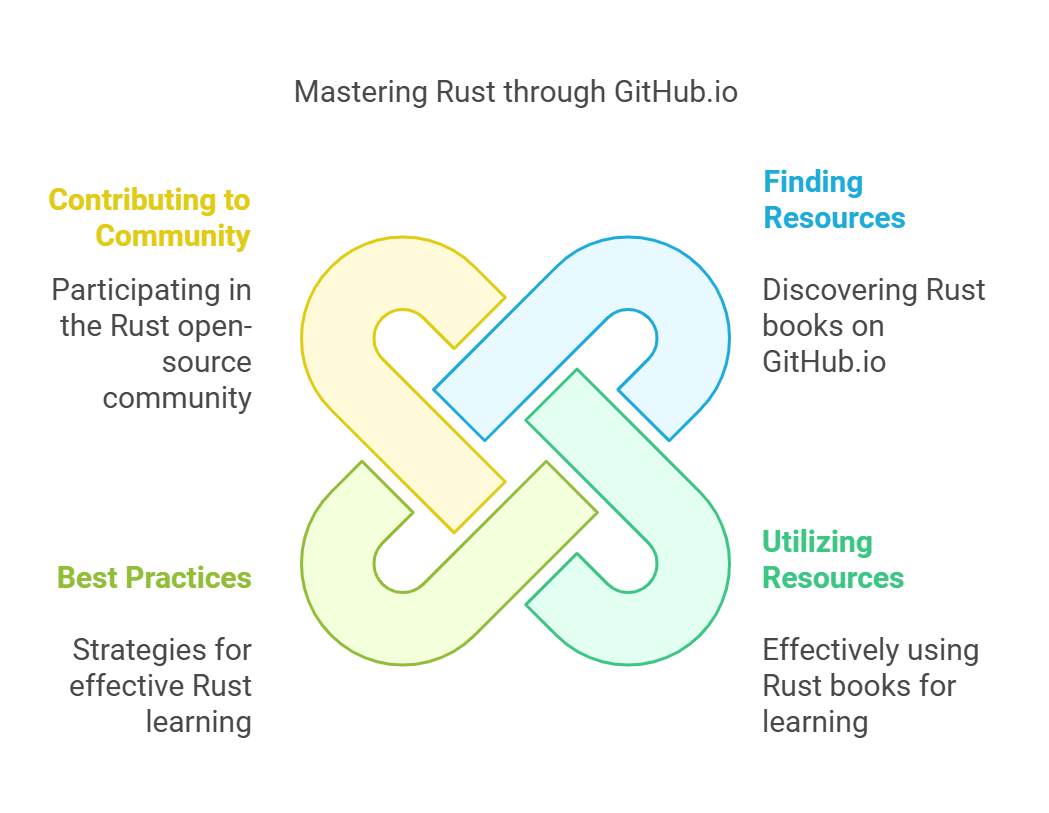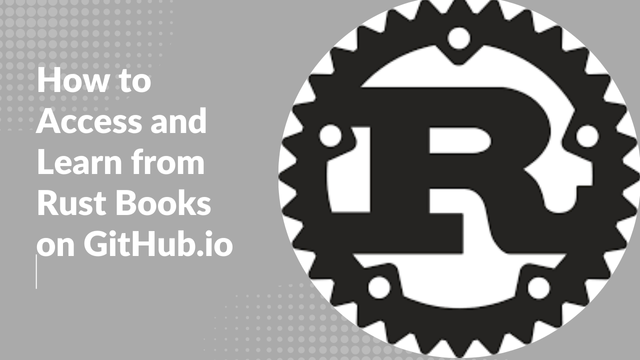Discover how to find and learn from Rust books hosted on GitHub.io. Access free resources, follow best practices, and contribute to open-source Rust books. Perfect for beginners and advanced developers!
How to Access and Learn from Rust Books on GitHub.io
Rust is a powerful programming language known for its safety, speed, and concurrency. For those looking to master Rust, the open-source community offers an incredible array of resources, including books hosted on GitHub.io. These books provide comprehensive knowledge ranging from beginner-friendly concepts to advanced programming techniques. This article will guide you on how to find, utilize, and benefit from Rust books on GitHub.io, while focusing on the best practices for effective learning.
What is GitHub.io?
GitHub.io is a platform for hosting web pages directly from repositories on GitHub. Many developers and organizations use it to share resources, including documentation, tutorials, and books. Rust developers frequently use GitHub.io to host books that are updated with the latest language features and best practices. These books are not only free but also represent the collective expertise of the Rust community.
Step 1: Finding Rust Books on GitHub.io
To access Rust books hosted on GitHub.io, follow these steps:
- Search Online: Use search engines with queries like:
- “Rust programming books site:github.io”
- “Learn Rust site:github.io”
- Visit the Official Rust Website: The official Rust website (rust-lang.org) often links to community-recommended books hosted on GitHub.io.
- Explore GitHub Repositories: Many Rust developers share their work on GitHub. Browse repositories with topics like “rust” or “rust-books” and look for GitHub.io links in the README files.
- Popular Rust Books on GitHub.io:
- “The Rust Programming Language”: This official book, often referred to as “The Book,” is the go-to resource for learning Rust.
- “Rust by Example”: A hands-on guide to learning Rust through practical examples.
- “Rust Design Patterns”: An excellent resource for learning idiomatic Rust and best practices.
Step 2: Navigating Rust Books on GitHub.io
Once you’ve found a Rust book on GitHub.io, follow these tips to navigate effectively:
- Table of Contents (TOC): Most books have a structured TOC that allows you to jump directly to topics of interest.
- Search Functionality: Use the browser’s search feature (Ctrl+F or Command+F) to find specific keywords or topics.
- Version Compatibility: Check if the book’s content matches your Rust compiler version to avoid discrepancies.
- Interactive Code Examples: Some books integrate interactive Rust code examples. Use these to test and experiment directly in your browser.
Step 3: Best Practices for Learning Rust
To make the most out of Rust books hosted on GitHub.io:
- Set Clear Goals: Define whether you want to learn Rust for system programming, web development, or another purpose.
- Follow a Learning Path:
- Start with “The Rust Programming Language”.
- Move to “Rust by Example” for practical exercises.
- Explore “Rust Design Patterns” for advanced concepts.
- Take Notes: Jot down key concepts, code snippets, and examples for quick reference.
- Practice Regularly: Write small Rust programs to reinforce what you’ve learned.
- Engage with the Community: Join Rust forums, Discord servers, and GitHub discussions to ask questions and share insights.
Step 4: Contributing to Rust Books
The beauty of open-source resources is that you can contribute to them. Here’s how:
- Identify Areas for Improvement: While reading a Rust book, note typos, outdated content, or missing sections.
- Fork the Repository: Clone the GitHub repository linked to the book.
- Make Changes: Update the content, fix issues, or add examples.
- Submit a Pull Request (PR): Share your contributions with the maintainers. Ensure you follow the repository’s contribution guidelines.
Step 5: Staying Updated
Rust evolves rapidly, with new features and updates introduced regularly. To keep your knowledge current:
- Subscribe to Rust Newsletters: Stay informed about new books and resources.
- Follow GitHub Repositories: Star and watch repositories to receive notifications about updates.
- Check Release Notes: Regularly review Rust’s release notes to understand changes and enhancements.
How to Access Idle Tower Defense Unblocked on GitHub

Benefits of Using Rust Books on GitHub.io
- Free Access: High-quality resources without any cost.
- Community-Driven: Authored and reviewed by experienced Rust developers.
- Interactive Learning: Many books offer code examples and exercises.
- Up-to-Date Content: Frequent updates ensure compatibility with the latest Rust versions.
- Open-Source Contribution: Opportunities to give back to the Rust community by contributing to books.
Frequently Asked Questions (FAQs)
1. How do I find official Rust books on GitHub.io?
Visit the official Rust website or search for “Rust programming books site:github.io” on search engines.
2. Are Rust books on GitHub.io free?
Yes, most Rust books hosted on GitHub.io are free and open-source.
3. Can I contribute to Rust books on GitHub.io?
Absolutely! Fork the book’s repository, make changes, and submit a pull request.
4. Are these books suitable for beginners?
Yes, many books like “The Rust Programming Language” are beginner-friendly.
5. How do I know if a book is updated for the latest Rust version?
Check the book’s repository or homepage for version compatibility details.


